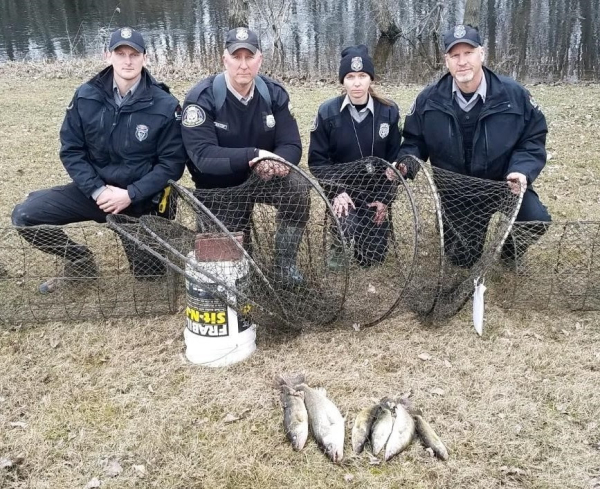Wisconsin DNR Cites Fish Trappers
 |
By: Joanne M. Haas/WDNR Bureau of Law Enforcement
Thanks to the outstanding teamwork of current and retired Wis. Department of Natural Resources conservation wardens, Lt. Ted Dremel was able to fulfill one of his top bucket list goals -- catch a fish trapper.
However, Lt. Ted and his team didn't catch just one violator - they caught two. And the Waupaca-based warden will repeatedly tell you he did it with the outstanding teamwork of several current and retired conservation wardens who ran the gamut from research to standing chest-high in cold water for 12 hours. Brrr!
"It took all of us to make this case," Lt. Ted said of the Wis. Department of Natural Resources wardens. "This was a total team effort."
News of Lt. Ted's team trapping case spread like a flash flood in the small river town of Shiocton in Outagamie County, where the Wolf River runs through town and the people understand the walleye as if they were kin.
And, everyone knows everyone. How is that possible? The U.S. Census counted 921 residents in 2010. And the town is 1.67 square miles. Do the math -- that's how everyone knows everyone.
loods make kayak check tough
Two years ago, WDNR Conservation Warden Kaitlin Kernosky, based in New London, received information about alleged fish trapping in the Wolf River. To the casual observer, that may sound easy to check. It's not.
Last year, Wisconsin experienced intense flood conditions -- and that hit the Wolf River and its tributaries which includes the Shioc River.
Pictured Above: From left to right, Wardens Zachary Seitz, Jeffrey Knorr, Kaitlin Kernosky and Lt. Ted Dremel with the fish trappers' equipment and illegally harvested walleyes.
"When the water goes up, it creates tens of thousands of acres of marsh in that area," Lt. Ted said. Add to that challenge is the rare nature of the walleye using the Wolf River system. "These walleyes are unique. They leave Lake Winnebago and go up the river. They do not want to spawn in the rocks and gravel. They spawn in the marshes."
Lt. Ted and Wardens Kaitlin Kernosky and Zachary Seitz spent four hours kayaking in one direction on the flooded Wolf looking for the reported traps in the marshes. They didn't find them - too much territory for three wardens in kayaks searching in the marsh area stretching a mile-and-a-half wide.
Now what? Do more homework on how fish trappers operate. Lt. Ted went to the experts - a couple of retired DNR wardens who worked fish trapping cases.
"They were a great resource. You have to do your homework," Lt. Ted said. This (case), I think, was the first successful fish trapping case in about 20 years on the Wolf."
Swamp watch: Just what it sounds like
The other part of the next step was not as exhilarating as hearing the stories from the retirees. Because the kayaking wardens could not find the traps in the massive area, the wardens went for swamp watch. It is exactly as it sounds - only worse. This meant taking turns spending time in the water, waiting and watching - not in a boat, IN the water. Not a lot of fun and not too easy on the bodily functions either.
How dedicated were the wardens to making the case? On April 9, Wardens Jonathan Kaiser and Zachary Seitz were in the water on watch for 12 hours. And the trappers never showed. April 9 - yes, they spent half a day in downright cold water.
Things got better the next day.
Sixteen minutes into a watch shift on April 10, Wardens Kaitlin and Jeff Knorr were standing in flooded timber on the Shioc River when they spotted the two men in their boat with equipment (fish traps and fish). The message was relayed. The timing of the messaging was perfect as Lt. Ted was nearby and able to walk up to the two men as they were leaving their boat with traps and a bucket of walleyes. The two men also had what is known as a miracle minnow, a female with spawn, in the trap to lure the male walleyes. On this day, the two men had caught 5 walleyes in the fish traps and brought back the "miracle minnow."
"I identified myself as a DNR warden and asked them what was going on," Lt. Ted said.
One of the men giggled back and said: "Isn't it obvious?"
Yes, it was, but Lt. Ted wanted them to explain it. By this time, Warden Zachary was on scene and more information was provided including additional illegally harvested fish.
It didn't take long for news of the two men caught fish trapping to spread in the small town. It was on social media and everyone knew.
The Outagamie County District Attorney took the case and the two men - James Shears, 52, and David Collar, 41 - were penalized. One man paid $1,169.40 in forfeitures and the other $1,288.90. Both were given a one-year revocation of Chapter 29 privileges (hunting, trapping and fishing privileges) followed by a two-year probation of those privileges. The court seized the traps used to illegally take the fish.
Another satisfying part of the case was Warden Jeffrey Knorr was there to help when the wardens caught the two fish poachers, which was just before Warden Jeff retired.
Having Warden Jeffrey on the team for the case was the frosting on the cake for Lt. Ted, who was thankful and grateful to have his longtime warden colleague help.
Teamwork strikes again!


 Advertising
Advertising